The Knights Templar - Chapter II.
Continued from The Knights Templar - Chapter I.
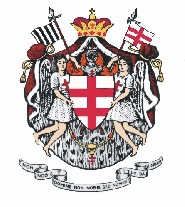 So here we are again with another chapter of the Knights Templar. This section will concentrate on the most curious parts of the rules and regulations of the Templars. Further points discussed in this chapterare are also: the confirmation of the rule by the Pope; the visit of Hugh de Payens, the Master of the Temple, to England; his cordial reception; the foundation of the Order in this country; lands and money granted to the Templars; their popularity in Europe; the rapid increase of their fraternity; St. Bernard takes up the pen in their behalf; He displays their valour and piety.
So here we are again with another chapter of the Knights Templar. This section will concentrate on the most curious parts of the rules and regulations of the Templars. Further points discussed in this chapterare are also: the confirmation of the rule by the Pope; the visit of Hugh de Payens, the Master of the Temple, to England; his cordial reception; the foundation of the Order in this country; lands and money granted to the Templars; their popularity in Europe; the rapid increase of their fraternity; St. Bernard takes up the pen in their behalf; He displays their valour and piety.I am also considering discussing, in the near future, the main reasons to Suleiman’s success in the second siege of Rhodes and the fail in the siege of Malta… there are a couple of books and documents that have taken my fancy… but we shall see on that…
“Every brother who is professed in the Holy service should, through fear of the flames of Hell, give total obedience to the Master; for nothing is dearer to Jesus Christ than obedience, and if anything be commanded by the Master or by one to whom he has given his power, it should be done without demur as if it were a command from God . . . for you must give up your own free will." - The Rule of the Templars, as recorded by scribe John Michael at the Council of Troyes, 1128
“When the Knights Templar were founded in 1118-1119 in Jerusalem, it was a 'poor order' whose primary function was the protection of pilgrims along the main roads between the coast at Jaffa and the inland city of Jerusalem. But an important transformation took place when this nascent Order came under the patronage of St Bernard of Clairvaux, nephew of AndrÄ de Montbard, one of the founding group of the Templars. Until his conversion at the age of twenty, St Bernard himself had been destined for a knightly career, and when he came to patronize the Knights Templar that Order was imbued with the ideals and convictions of the knightly class of Burgundy.” - Edward Burman, The Assassins - Holy Killers of Islam
Regula Pauperum Commilitonum Christi et Templi Salomonis.
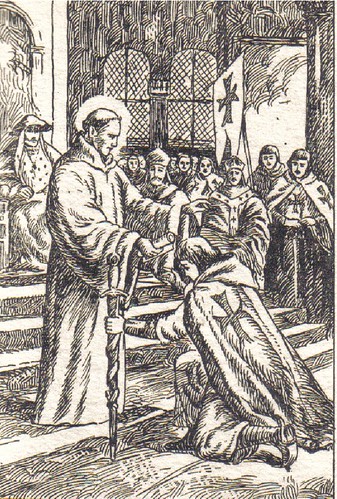
"THE RULE OF THE POOR FELLOW-SOLDIERS OF JESUS CHRIST AND OF THE TEMPLE OF SOLOMON," arranged by St. Bernard, and sanctioned by the Holy Fathers of the Council of Troyes, for the government and regulation of the monastic and military society of the Temple, is principally of a religious character, and of an austere and gloomy cast. It is divided into seventy-two heads or chapters, and is preceded by a short prologue, addressed "to all who disdain to follow after their own wills, and desire with purity of mind to fight for the most high and true king," exhorting
p. 16
them to put on the armour of obedience, and to associate themselves together with piety and humility for the defence of the holy catholic church; and to employ a pure diligence, and a steady perseverance in the exercise of their sacred profession, so that they might share in the happy destiny reserved for the holy warriors who had given up their lives for Christ.
The rule enjoins severe devotional exercises, self-mortification, fasting, and prayer, and a constant attendance at matins, vespers, and on all the services of the church, "that being refreshed and satisfied with heavenly food, instructed and stablished with heavenly precepts, after the consummation of the divine mysteries," none might be afraid of the fight, but be prepared for the crown. If unable to attend the regular service of God, the absent brother is for matins to say over thirteen pater-nosters, for every hour seven, and for vespers nine. When any templar draweth nigh unto death, the chaplains and clerk are to assemble and offer up a solemn mass for his soul; the surrounding brethren are to spend the night in prayer, and a hundred pater-nosters are to be repeated for the dead brother. "Moreover," say the holy Fathers, "we do strictly enjoin you, that with divine and most tender charity ye do daily bestow as much meat and drink as was given to that brother when alive, unto some poor man for forty days." The brethren are, on all occasions, to speak sparingly, and to wear a grave and serious deportment. They are to be constant in the exercise of charity and almsgiving, to have a watchful care over all sick brethren, and to support and sustain all old men. They are not to receive letters from their parents, relations, or friends, without the license of the master, and all gifts are immediately to be taken to the latter, or to the treasurer, to be disposed of as he may direct. They are, moreover, to receive no service or attendance from a woman, and are commanded, above all things, to shun feminine kisses.
p. 17
There is much that is highly praiseworthy in this rule, and some extracts there from will be read with interest.
"VIII. In one common hall, or refectory, we will that you take meat together, where, if your wants cannot be made known by signs, ye are softly and privately to ask for what you want. If at any time the thing you require is not to be found, you must seek it with all gentleness, and with submission and reverence to the board, in remembrance of the words of the apostle: Eat thy bread in silence, and in emulation of the psalmist, who says, I have set a watch upon my mouth; that is, I have communed with myself that I may not offend, that is, with my tongue; that is, I have guarded my mouth, that I may not speak evil.
"IX. At dinner and at supper, let there be always some sacred reading. If we love the Lord, we ought anxiously to long for, and we ought to hear with most earnest attention, his wholesome words and precepts . .
"X. Let a repast of flesh three times a week suffice you, excepting at Christmas, or Faster, or the feast of the Blessed Mary, or of All Saints. . . . . On Sunday we think it clearly fitting and expedient that two messes of flesh should be served up to the knights and the chaplains. But let the rest, to wit, the esquires and retainers, remain contented with one, and be thankful therefor.
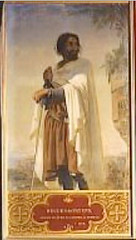 "XI. Two and two ought in general to eat together, that one may have an eye upon another . . . . . .
"XI. Two and two ought in general to eat together, that one may have an eye upon another . . . . . ."XII. On the second and fourth days of the week, and upon Saturday, we think two or three dishes of pulse, or other vegetables, will be sufficient for all of you, and so we enjoin it to be observed; and whosoever cannot eat of the one may feed upon the other.
"XIII. But on the sixth day (Friday) we recommend the Lenten food, in reverence of the Passion, to all of you, excepting such as be sick; and from the feast of All Saints until Easter, it must be eaten but once a day, unless it happen to be Christmas-day, or the feast of Saint Mary, or of the Apostles, when they may eat thereof twice; and so at other times, unless a general fast should take place.
"XIV. After dinner and supper, we peremptorily command thanks to
p. 18
be given to Christ, the great Provider of all things, with a humble heart, as it becomes you, in the church, if it be near at hand, and if it be not, in the place where food has been eaten. The fragments (the whole loaves being reserved) should be given with brotherly charity to the domestics, or to poor people. And so we order it.
"XV. Although the reward of poverty, which is the kingdom of heaven, be doubtless due unto the poor, yet we command you to give daily unto the almoner the tenth of your bread for distribution, a thing which the Christian religion assuredly recommends as regards the poor.
"XVI. When the sun leaveth the eastern region, and descends into the west, at the ringing of the bell, or other customary signal, ye must all go to compline (evening prayer;) but we wish you beforehand to take a general repast. But this repast we leave to the regulation and judgment of the Master, that when he pleaseth you may have water, and when he commandeth you may receive it kindly tempered with wine: but this must not be done too plentifully, but sparingly, because we see even wise men fall away through wine.
"XVII. The compline being ended, you must go to bed. After the brothers have once departed from the hall, it must not be permitted any one to speak in public, except it be upon urgent necessity. But whatever is spoken must be said in an under tone by the knight to his esquire. Perchance, however, in the interval between prayers and sleep, it may behove you, from urgent necessity, no opportunity having occurred during the day, to speak on some military matter, or concerning the state of your house, with some portion of the brethren, or with the Master, or with him to whom the government of the house has been confided: this, then, we order to be done in conformity with that which hath been written: In many words thou shalt not avoid sin; and in another place, Life and death are in the hands of the tongue. In that discourse, therefore, we utterly prohibit scurrility and idle words moving unto laughter, and on going to bed, if any one amongst you hath uttered a foolish saying, we enjoin him, in all humility, and with purity of devotion, to repeat the Lord's Prayer.
"XVIII. We do not require the wearied soldiers to rise to matins, as it is plain the others must, but with the assent of the Master, or of him who hath been put in authority by the Master, they may take their rest; they must, nevertheless, sing thirteen appointed prayers, so that their minds be in unison with their voices, in accordance with that of the prophet: Sing wisely unto the Lord, and again, I will sing unto thee in the sight of the angels. This, however, should always be left to the judgment of the Master . . . . . . . (Continued in Au piranha’s warehouse)
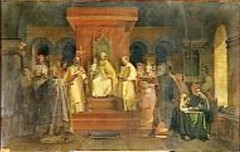
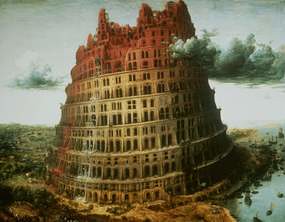


7 Comments:
Ohhhh, juicy topic. I was just reading in that book I mentioned before (The Great Mortality) about the persecution of the Templars before the black plague hit France. It seems the crown was after their money.
But that lifestyle, it's just not for me. Tabezu, nomazu ni wa, irarenai yo. I can't live without eating and drinking, especially to excess.
Still - have you read the Davinci Code?
It made some interesting references to Knights Templar.
And I personally believe that a lot of them were righteous upholders of their faith - I do think that there was a ragtag motley crue of them that chose to use their positions of power to santize all that stood in their way in order to seek gain.
There are so many different versions of the Knights - that I would love if you posted more.
Very juicey topic Melinda - LOL!
Wager Witch
Don’t worry Melinda; neither could they and let alone living without eating and drinking, especially to excess, there are also relevant indication that throughout Christendom the members of the order of Knights Templar practiced homosexual acts of various sorts from illicit kisses to sodomy (how ironic).
And you are absolutely right in regards to the fact that they were persecuted and eventually annihilated: when the Crusades failed, the Hospitalers became a naval patrol in the East, but the Templars grew more worldly, more decadent, and more hated. In 1307, Philip IV of France, who needed money for his Flemish war and was unable to obtain it elsewhere, began a persecution of the Templars. With the aid of Pope Clement V, the king had members of the order arrested and their possessions confiscated. By 1308 the persecutions were in full process. The knights were put on trial and were tortured to extract confessions of sacrilegious practices. The pope at first opposed the trials but soon reversed his position, and at the Council of Vienne (1311–12) he dissolved the order by papal bull.
The Templars were completely destroyed by 1314. Much of their property, theoretically designated for the Hospitalers, was acquired by secular rulers. The leaders of the order, including the last grand master, Jacques de Molay, were tried by ecclesiastic judges and sentenced to life imprisonment, but after denouncing their confessions they were burned at the stake (1314) as lapsed heretics by civil authorities. It is impossible to evaluate fairly the Templars and their fate; the injustices of their final treatment have led some to consider them blameless, yet the charges against them were not entirely unfounded*.
*The Columbia Electronic Encyclopedia, 6th ed. Copyright © 2006, Columbia University Press. All rights reserved.
Nope I haven’t read the Davinci Code, dear Witch and nor I have seen the film – both a bit too commercial for my taste…
In the near future, time permitting, I was thinking to write about the Second Siege of Rhodes (June 1522) and the siege of Malta (May 1565). I am afraid that this, however, won’t answer your questions in relation to the different views on the Templars.
gomen ne, isogashiku natte, blog no koto suru jikan ga nakatta. sorry i've been busy and haven't had time to do blog stuff.
but now i'm free! natsu yasumi ga hajimatta yo. my summer vacation has begun, which means 2 1/2 months of me lazing around.
i thought that those allegations of homosexual naughtiness were just trumped-up charges by phillip and his minions to further discredit the templars.
as for the davinci code, i love the big l, but i think i can live without his code. dan brown's prose is far too painfful; it's a bit like being tortured in the 1300s.
have you guys ever been to malta? my partner is obessed with that floor. you know the one...
It's quite alright.
However - I think you would find the book very interesting, because while it is written as a fictional account of today's time - I think it is not so "commercial" as you may think. I have not seen the movie - but did read the book.
I thought it would be a flash in the pan. But quickly realized it was an in depth look at religion - the Knights Templar and a whole group of interesting religious information based on facts... of course the author allowed his own twists, but there was some SERIOUS research put behind the book.
I wouldn't say that the plot and the book was the greatest thing ever - but I would say - with my interest in religions and religious concepts and principles and the varied enactments of laws of religions, I found the book to be priceless with information that was quite indicative of more truth than fiction.
Egads - I hope that made sense. LOL!
But I await more of your writing!
Wager Witch - http://wagerwitch.blogspot.com
Free no deposit no purchase necessary casino bonus offers, repeat deposit deals, online casino promotions, savvy gambling advice for both the new and the seasoned gambler!
You want to know something else that has always fascinated me?
Masada.
Something rarely discussed - rarely even talked about.
But the fall of Masada was an amazing event back then - and the world was a much different place.
And Melinda - Oh my yes! His writing is dry - not at all commercial fiction.... like I said - he spent many years in research - to have such a simplified plot with all of that knowledge was amazing.
Wager Witch - http://wagerwitch.blogspot.com
Free no deposit no purchase necessary casino bonus offers, repeat deposit deals, online casino promotions, savvy gambling advice for both the new and the seasoned gambler!
Post a Comment
<< Home